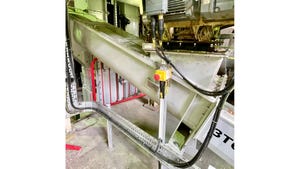Many common problems in bulk solids handling are entirely preventable
March 2, 2022

Professor Mark Jones FRSN, Pro Vice-Chancellor (Education Innovation), University of Newcastle, Australia
The range and scope of manufacturing industries that, at least at some stage of the process, handle particulate materials in bulk form is vast. Yet there have been many reports and analyses over the years that have pointed to the fact that interruptions and bottlenecks occur many times more often when the process involves the handling of bulk solids.
In many ways this is not surprising, the science and technology of bulk materials handling is multi-disciplinary in nature spanning the purview of chemical, process, mechanical, and civil engineering to name but a few. I have made the observation in this type of editorial on previous occasions that the interdisciplinary nature of bulk solids means it tends to fall between disciplines and hence is not a central focus of any discipline and therefore is rarely taught in undergraduate engineering programs.
However, the corollary of this is that, so often, the first time an engineer becomes aware of the problems in bulk solids handling is when they take up a job in the process industry and discover just how problematic these systems can be. This is most unfortunate since much of the fundamental theory has been in existence for more than 60 years and some of the theory goes back more than 120 years. Much of the development of the fundamental work in bin design took place in the late 1950s and early 1960s and further significant developments have taken place over the intervening years. Hence, it does not have to be like this and many common problems in bulk solids handling are entirely preventable.
In more than 30 years of experience in the field, I have been pondering as to why this state of affair exists. First, as already mentioned, very few engineers are ever taught the fundamentals of bulk materials handling. This is an issue given the extensive use of bulk solids handling equipment across so many process and manufacturing industries. Even equipping students with a cursory acknowledgement that there is a whole body of knowledge that exists to address many of these problems would be a good start.
Second, in working with companies worldwide, I have so often been handed “drawings” that essentially describe the unit operations in a process with no accompanying documentation that describes the interfaces between units or the design of equipment. It can be a grave mistake to consider unit operations in isolation – essentially focusing on the logistics of the problem rather that the detailed interaction between the bulk material and the equipment.
Unlike liquids, there is a wide range of material properties that dictate how the material will behave. If equipment is not designed with a full understanding of the material properties, the likelihood of reliable operation is extremely low. In addition, it is often the interfaces between the various pieces of equipment that are of paramount importance. The classic example of this is, of course, a hopper or silo that has not been designed based on the flow properties of the bulk solid, and hence cohesive arches can form across the flow channel preventing flow. Under these circumstances it does not matter how good the feeding device below the hopper might be if material does not flow to the feeder.
Of course, this type of problem is totally preventable, but it does rely on those responsible for procuring equipment knowing that there is a fully proven method of designing and interfacing equipment based on the flow properties of the bulk material to be handled. It also relies on avoiding the temptation to “save money” on upfront design costs only to pay dearly many times over due to down time, lack of productivity, and unreliable operation. The solution is in our own hands!
Professor Mark Jones, PhD, holds the Chair in Bulk Solids Handling at the University of Newcastle, Australia. He is also the director of the Centre for Bulk Solids and Particulate Technologies and director of TUNRA Bulk Solids Handling Research Associates. He has worked in the field for more than 35 years, researching and working with industry worldwide. He is currently pro vice-chancellor (education innovation) at the University of Newcastle, Australia.
You May Also Like


